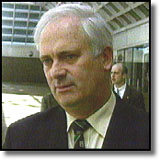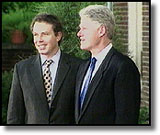
|
Britain and Ireland Agree Terms for Arms DecommissioningThe British and Irish governments have reached agreement on handling the issue of decommissioning IRA and other terrorist weapons, following a meeting in New York between Tony Blair and the Irish Prime Minister, John Bruton.
While disclosing no details, Mr Bruton claimed all the clarification questions put by Sinn Fein had been answered. He said that the new position left Sinn Fein with the choice of taking the political road and rejecting violence, or pursuing their current "twin track" approach with the IRA. Sinn Fein president Gerry Adams has promised his Party would "study very carefully whatever proposals on decommissioning the two Governments had agreed". The West Belfast MP said decommissioning was central to the failure of what he called the last peace process. He said Sinn Fein had placed no pre-conditions at all upon a real process of credible negotiations. "We believe that such negotiations, if they are to lead to a democratic peace settlement, must be based upon equality, which the present talks lack, and must be inclusive and aimed at resolving the core constitutional, political and other matters which underpin the conflict here." Mr Adams said that he wanted to acknowledge that Tony Blair's Government had adopted a different approach to that of John Major, who had placed obstacles on the path to peace. Initial reaction from the unionists was somewhat less favourable.
Earlier the Prime Minister warned Sinn Fein that he was prepared to leave them out of the talks unless they helped bring about an unequivocal IRA ceasefire. On Sunday, Mr Blair won the backing of the US president Bill Clinton to exclude Sinn Fein from the talks, as long as the IRA did not agree to ceasefire. Mr Blair told the President that Britain had previously promised Sinn Fein it could have a seat at the peace talks, if the IRA observed a written pledge of a six-week ceasefire. According to British officials the IRA response to the initiative was last week's killing of two policemen in an ambush in Lurgan, southwest of Belfast. President Clinton said "the ball is [now] in Sinn Fein's court. We all have to decide. Everybody has decisions to make in life - their decision is: are they going to be part of this peace process or not?" A senior White House official said the US would be following Britain's lead on the Northern Ireland issue, but stressed that the Prime Minister had not asked the President to sever all connections with Sinn Fein. Mr Blair said he was very grateful for the president's private and public expressions of support. Government sources confirmed that the president was very supportive of the approach the Prime Minister and the Irish government had taken. Government Talks to Nationalist ResidentsMeanwhile, efforts continued to defuse the tension surrounding this summer's marching season in Ulster. The Northern Ireland Secretary, Mo Mowlam, met nationalist residents from the Bogside estate in Londonderry, the latest in a series of talks she had with nationalists and the Orange Order and the Apprentice Boys in a bid to find agreement on parades. Ms Mowlam described the meeting as "productive and constructive".On Sunday several stand-offs across Northern Ireland between nationalist residents and Orangemen ended without violence. RUC officers kept both sides apart and the Orange marchers accepted a police re-routing of their parade. But there is still no sign of an agreement over the Drumcree parade scheduled to take place in Portadown, County Armagh, in less than two weeks. Last year confrontations during this parade caused several days of violence. |
Diana, Princess of Wales, 1961-1997
Conference 97
Devolution
The Archive
News |
Issues |
Background |
Parties |
Analysis |
TV/Radio/Web
Interactive |
Forum |
Live |
About This Site
News |
Issues |
Background |
Parties |
Analysis |
TV/Radio/Web
Interactive |
Forum |
Live |
About This Site
© BBC 1997 |
politics97@bbc.co.uk |


